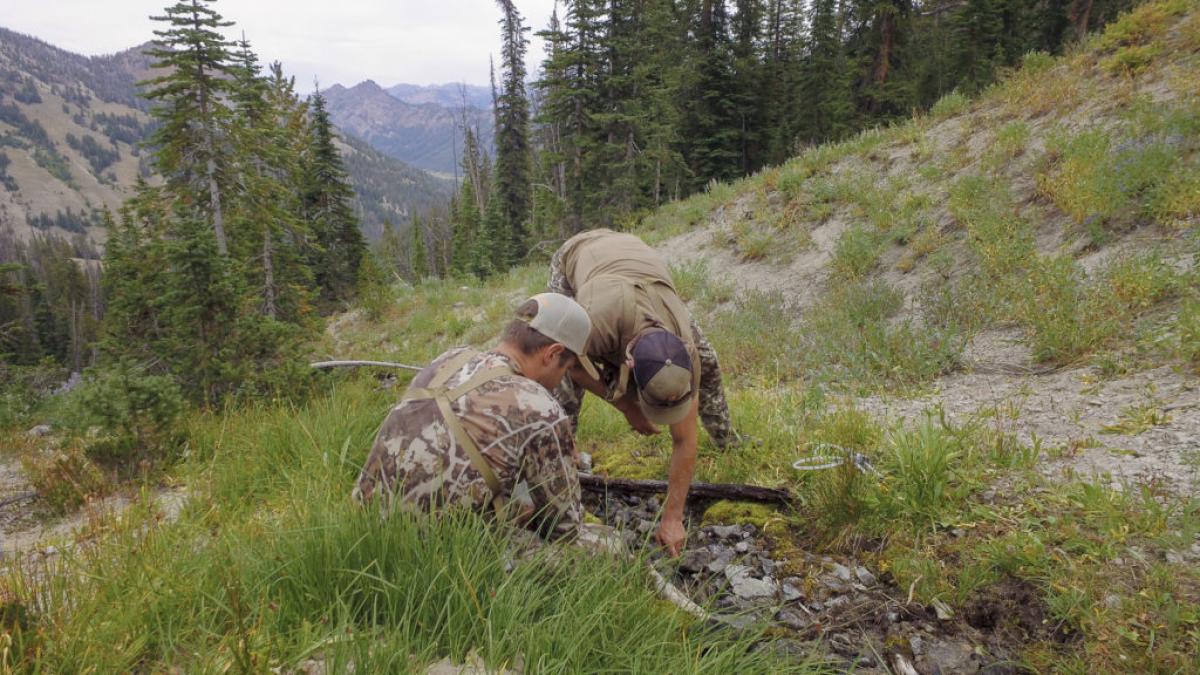
Backcountry Water Purification
By Brad Brooks
Giardia, which is often referred to as “beaver fever”, is thought to be the most common parasite associated with ingesting un-purified water. Symptoms include uncontrolled bowls, intense stomach cramps, vomiting, dehydration, fever and general malaise. You don't want Giardia, particularly when you are backcountry hunting. Luckily Giardia and other water-loving bacteria and parasites are completely avoidable for the average wilderness hunter with the incredibly large inventory of water purification products on the market.
Do You Even Need to Purify?
I've been known to drink straight from the source if I find a spring deep in the backcountry and I know there haven't been domestic livestock in the area and people. However, I wouldn't recommend rolling the dice like that unless you're prepared for the potential consequences. I seem to have a propensity to use my body as a science experiment.
Research shows that giardia is not as common as people think in the backcountry, and you are more likely to contract E. coli or some other bacteria than giardia. What is even more fascinating is a study from California that sampled 100 different streams and lakes in the high Sierra Wilderness in California found an incredibly low number of water sources were actually contaminated with water born bacteria and parasites. This study found that most water sources in the backcountry were remarkably safe to drink from, including lakes.
This doesn't mean you should use your body as a science lab, but it does mean the assumption that you must filter is not always true and depends on the where you are at. If you do decide to drink without a filter (not recommended), here are some tips:
- Drink at or as close to the source as possible
- Don't drink unpurified water if there has been any livestock grazing or a lot of human activity in the area
- Make sure you are deep in the backcountry
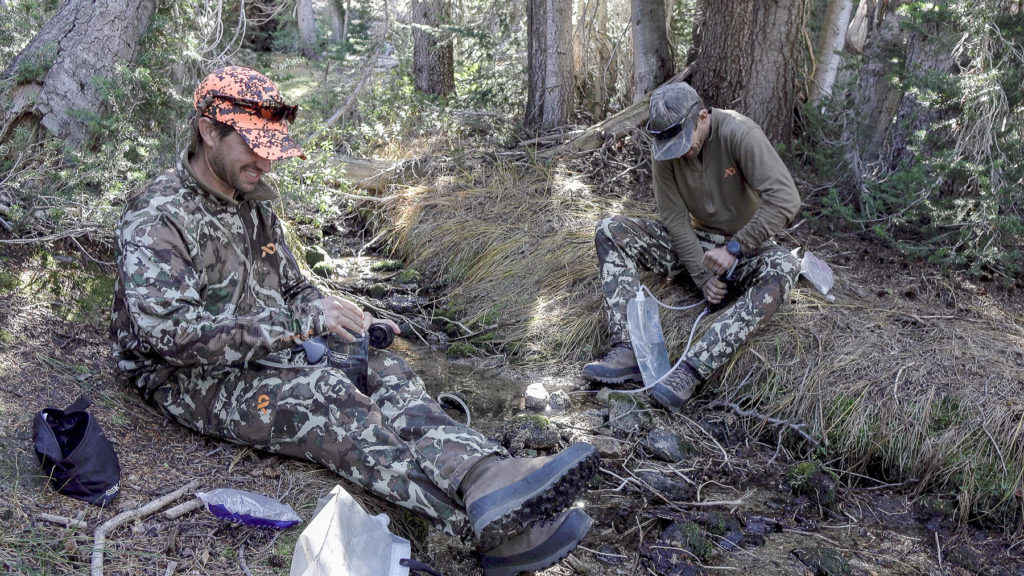
Water Purifiers
Best practices for hunting in the backcountry still includes using a water purifier. Modern science gives you plenty of options to purify your water, but not all water purifiers are ideally suited to meet the needs of a backcountry hunter.
There are a number of factors to consider when picking a filter, and most people will focus on weight, size and price. Those are good factors, but it's important to also think about flow rates (for purifiers that use a filter), longevity (either the battery or the filter) and suitability for hunting situations.
There are any number of water purifiers out there, but most purifiers break down into these categories:
- Pump filters- These are your traditional pump handled water filters. I’ve used this more than any other filter thoughout my life and they have they’re upsides. I’m not a huge fan of pumping, but the pump filters do have better protection against freezing late in the season and a decent filter life.
- Gravity filters- More on these below, but these filters don’t require batteries or much effort as gravity does the work for you. Gravity filters are definitely my favorite type of filter.
- UV Treatment- These small and relatively light water filters run off of batteries and will keep you from ingesting harmful bacteria and parasites with UV light. Interestingly, the UV doesn’t kill all parasites, it apparently scrambles their DNA so they can’t reproduce. I’ve used them a fair amount and haven’t contracted any illness, but I have a mental hurdle I can’t get over with using a filter that requires batteries.
- Purification drops/tablets- There are several out there, but this super light purification method utilizes a chemical to cleanse your water. I would recommend staying away from the iodized purification tablets, which give a salt-water like flavor to your water. Liquid purification drops are cheap, quick to use and they don't leave a bad taste since most of them use chlorine (the same way most city drinking water is cleansed). The downside to drops is there isn’t a way to filter out particulate matter, and you have to wait a while after adding drops (depending on how cold the water is, it can take 20-30 minutes for the drops to perform their function). If you do want to check out drops, I'd recommend looking at the Aqua Mira drops.
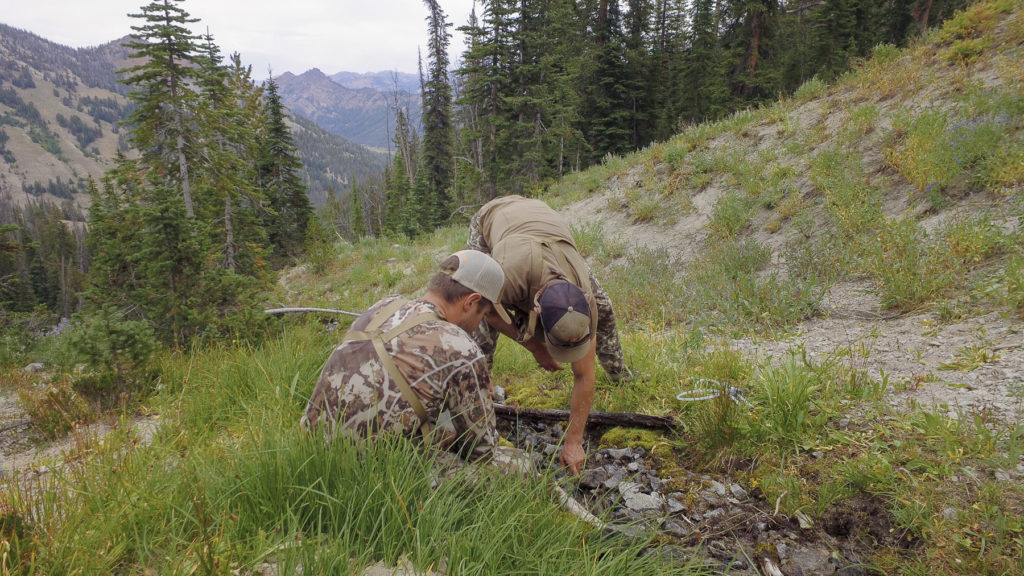
Our Favorite Backcountry Purifiers
I've used pretty much every method of water purification out there, but I prefer to use a more traditional purifier over drops or UV treatment. Below are my top three purifiers as well as my honest account of the pros and cons of each.
1. Platypus Gravity Works-The less I have to work to filter water when hunting in the wilderness, the better. The Gravity works is a fantastic, super light and small filter that allows for hands-free filtering at a quick pace. With a fresh filter you can get 1.5 liters of water a minute by letting gravity do the work for you.
The Gravity Works Kit comes with a variety of attachments. If you want to go ultralight, you can rig a system to only take the “dirty” water bag, filtering element and a hose coming out of the filter for a water filtration system that clocks in around 2.3 ounces. Interestingly, the filtering element on this purifier is exactly the same weight as the Sawyer squeeze (see side by side Sawyer and Gravity works weight photos below).
While the Gravity Works and the Sawyer are nearly identical in weight and size, biggest differences I’ve found are 1) better flow through the filter; 2) it is much easier to fill the "dirty" water bag, and 3) longer filter life. It is more expensive, but what you get is an easier filter to use (no squeezing required), and a fairly longer filter life. The filling of the dirty water bag is not to be understated either. With small springs and water sources, it is much easier to fill the dirty water bag on the Gravity Works than the Sawyer.
The Gravity works is more expensive at $109, and you do get some convenience features for the extra money. If you don't mind paying the extra money, this filter is worth purchasing.
A relatively cheap and incredibly light water filter that clocks in around 2.3 ounces (see side by side Sawyer and Gravity works weight photos below). The Sawyer Squeeze is a great, small, lightweight and packable filter for backcountry hunters. You can throw this filter in your pack and it is hardly noticeable. Like the Gravity Works, this filter can be rigged to filter from your drinking hose directly into your water bladder so you don’t have to remove your water bladder. You can also drink directly from a dirty water bag.
I like the Sawyer a lot and use it frequently. At $40 it is also relatively inexpensive. One of the downsides of the Sawyer is the "dirty" water bag has a small opening, and if the water source you are trying to filter from is small or has a very low flow, it can be a pain to get water in the bag. In this situation, the proprietary gravity works dirty water bag works much better. The other downside is filter life, which does not last as long as the Gravity Works in my experience. The other downside is water flow as water doesn't flow as easily through the filter and requires a fair bit of pressure to force water through the filter.
3. Katahdyn Hiker Pro- This purifier is a pump style filter and it is one of the more common filters on the market. Out of the three most common filters I use, pump style filters are my least favorite form of purifying water, although there are reasons for using pump filters. A pump filter typically consists of a hard-plastic case with a water filter that screws into the middle of it. Most of the water filters that require pumping are going to be heavier than other purification options.
I'm not a fan of the long sessions pumping with these filters. However, I do use them on late season hunts when it is freezing hard every night, or not getting above freezing during the day. Unlike some of the ultralight water filters, the hard plastic case provides an added layer of protection to keep your filter element from freezing. That’s important because if your filter freezes it is mostly useless in terms of doing the job its supposed to do.
Important word on freezing-Both the Gravity Works and the Sawyer are relatively useless if they freeze as the expansion of freezing water will destroy the filtering element on these ultra light filters. For colder weather situations (Mid October or later typically), you need to keep this filter close to your body or buried in your backpack, and be sure to "shake" the water out of the filter when you get done using it.
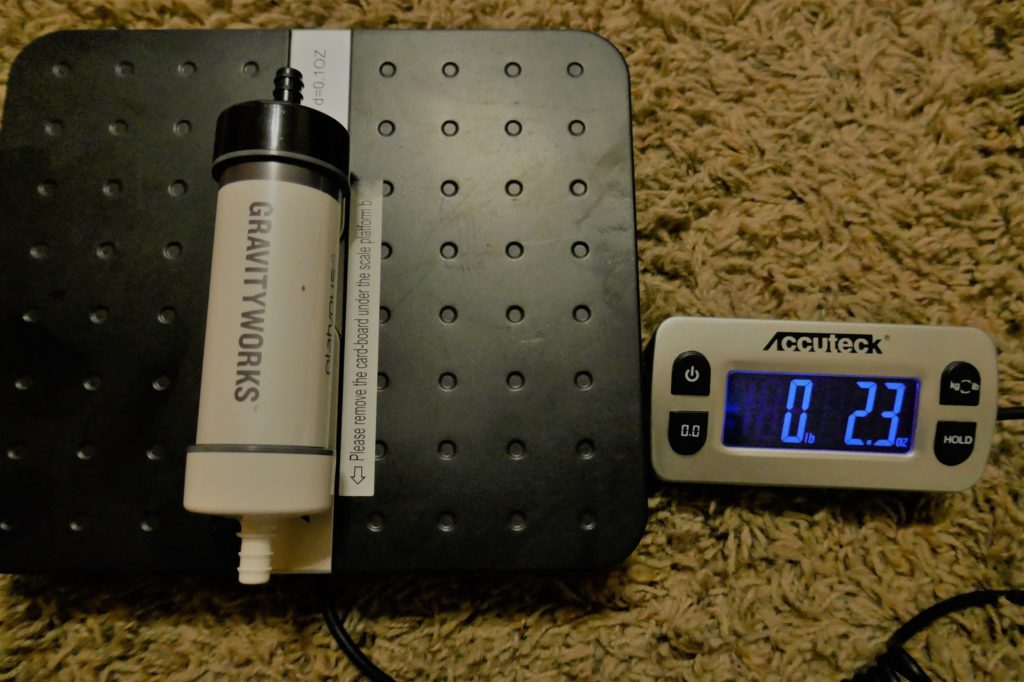
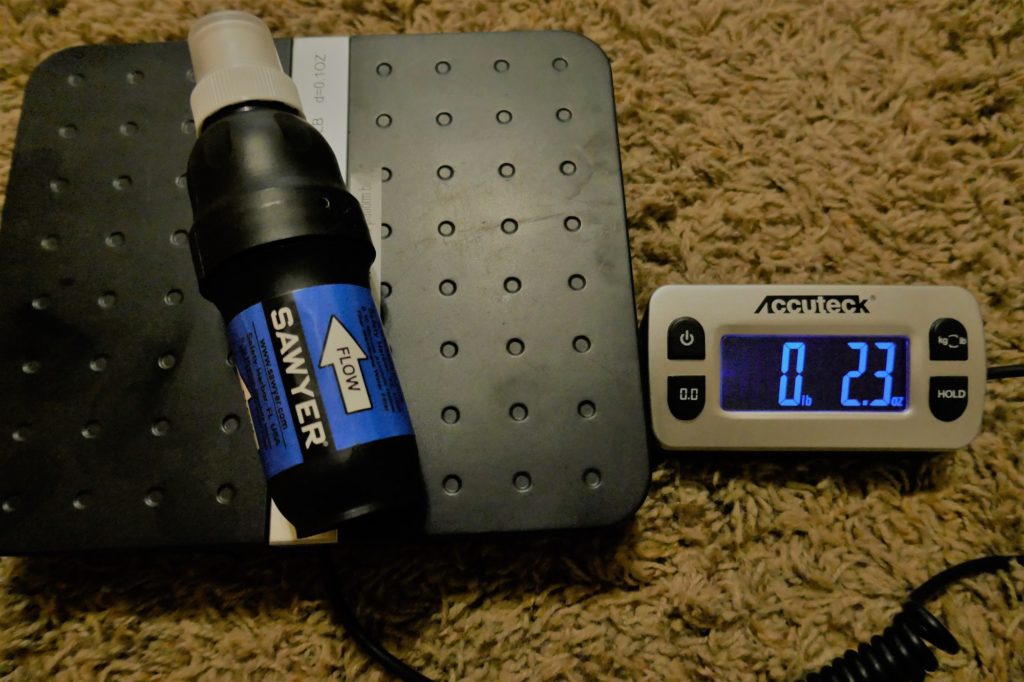
Which Water Filter to Use
Buy whatever filter you can afford, and since one filter won't last you forever you will have an opportunity to buy another filter. Any one of the filters above will work for nearly all hunting situations so pick one and try it out.
Let me know if you have a favorite filter that I didn't cover here, and be sure to check out our other articles on making your own backcountry meals, picking a lightweight hunting tent and more.